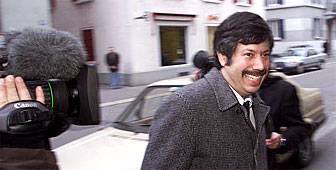Warnings about Swissair ignored, says former banker

Prompt action could have averted Swissair's collapse, says a former Credit Suisse analyst, who claims he was sacked after warning of the airline's financial problems.
More than a year before Swissair’s collapse, it was clear that the airline was in deep trouble, says Christoph Chandiramani. Yet his warnings that the airline was heading for financial disaster went unheeded, leading to the biggest corporate collapse in Swiss history.
In an exclusive interview with swissinfo, Chandiramani said he first warned of problems at the Swissair Group on July 6, 2000, shortly after the departure of Swissair head, Jeff Katz, and following negative news reports about the airline group on Swiss television.
He claims he was sacked by Credit Suisse four days later, simply because he had dared to publish negative comments about the Swissair Group.
Settlement accepted
Chandiramani sued Credit Suisse for unfair dismissal, before accepting an out-of-court settlement of SFr200,000 ($121,000).
It was not until January 2001 that the extent of Swissair Group’s problems started to become clear, following the departure of the group’s boss, Philippe Bruggisser. He had been pursuing an overly-ambitious expansion strategy by buying stakes in loss-making foreign carriers, including Belgium’s Sabena.
Months later, with the airline in dire financial trouble, the entire board resigned, except Mario Corti, who took over as chairman and chief executive to try to turn the group’s fortunes around.
Corti managed to keep the group afloat until late September, when the resulting drop in air travel in the wake of the September 11 attacks in the United States, proved too much, and he was forced to seek protection from creditors.
Emergency loan
The government was forced to intervene with an emergency bridge loan of SFr450 million to keep the airline flying. It is now desperately seeking investment from business to salvage the remains of Swissair to form a new national carrier.
Chandiramani says he was surprised that no action was taken when the scale of the problems at Swissair started to become clear.
“We were predicting losses of perhaps SFr1 billion at the maximum,” but the debts accumulated, explained Chandiramani. “I didn’t expect the company to collapse, I expected the state and the banks to intervene and that the company would survive.”
Chandiramani says that when spoke out about Swissair, and advised investors to sell the group’s shares, he was ordered to make a retraction. He adds that he believes the order came directly from Credit Suisse Group chief executive, Lukas Mühlemann.
Chandiramani’s account
“Oswald Grübel [head of Credit Suisse Private Banking] phoned and told us to correct the news and said we must recommend Swissair shares on a buy again. Mr Grübel phoned me because Mr Mühlemann had phoned him – he ordered me to correct this news we published on the Internet.”
In Chandiramani’s view, Credit Suisse’s decision to ignore the evidence that Swissair was in dire financial trouble was a clear case of a conflict of interest.
“Mr Mühlemann was chief executive at Credit Suisse and a member of the board of Swissair. And it was the same with Philippe Bruggisser – he was the head of Swissair and a member of the Credit Suisse Board. It was a… conflict of interest.
When contacted by swissinfo, the Credit Suisse Group said it had nothing more to say about Chandiramani’s allegations.
by Tom O’Brien

In compliance with the JTI standards
More: SWI swissinfo.ch certified by the Journalism Trust Initiative
You can find an overview of ongoing debates with our journalists here. Please join us!
If you want to start a conversation about a topic raised in this article or want to report factual errors, email us at english@swissinfo.ch.